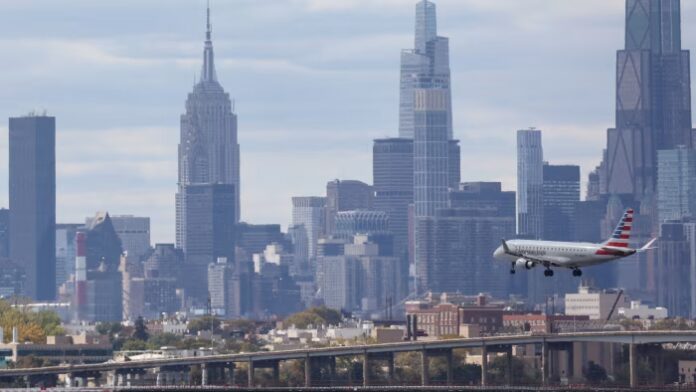Airlines are facing cancellations and disruption as the US government shutdown enters its third full week.
The freeze on federal government funding, which began on October 1, means air traffic controllers are working without pay as “essential workers”.
Many are staying at home, placing strains on an already-stretched system. Last week, US transportation secretary Sean Duffy claimed about 10 per cent of ATC employees were calling in sick, or simply not turning up to work.
“Some airports are seeing significant delays,” Lufthansa chief executive Carsten Spohr said on Tuesday.
The German carrier, which partners with United in the US, is being hit by disruption to feeder flights from US-based carriers rather than its own aircraft that fly to Europe, Spohr said.
Lufthansa is also being affected by slower certification of new aircraft, with the shutdown preventing inspections needed to sign off new seats in its Boeing 787 model, he added.
Staff-related delays have hit airports including Austin, Texas, and Nashville, Tennessee, while worker levels at other sites are down as much as 50 per cent, leading flights to be held up or rerouted.
The National Air Traffic Controllers Association has urged its members to turn up to work despite the shutdown. “We cannot stress enough that it is essential to avoid any actions that could reflect poorly on you, our union, or our professions,” it said in a message to members.
“Any time there is a government shutdown, the impact on aviation is really core,” said Billy Nolen, the former head of the Federal Aviation Authority, the government-funded agency that regulates air travel.
Last week, Delta Air Lines — the first of the big three American carriers to report its annual earnings — said it expected the situation to deteriorate the longer the shutdown lasts, even though the early impact on its business was negligible.
“If this extends beyond next week, pay closer attention, but for now we’re in pretty good shape,” Delta chief executive Ed Bastian told the Financial Times.
The shutdown has strained a sector that was struggling with a shortage of air traffic controllers that has disrupted flights across the US and been tied to fatal accidents.
The staff shortfall has been blamed on funding cuts and failure to attract enough people to the industry. About $30bn is needed for a fundamental overhaul of the air traffic control system, allowing it to update technology and other equipment, according to Nolan.
“The agency can only do what they have allocated funds to do by Congress,” he added.
Airlines have long been calling for the modernisation of the system. “The modernisation of ATC has been talked about for a long, long time in the US and not seemingly prioritised,” said John Mowry, head of Alton Aviation Consultancy.
In 2018, a 35-day federal shutdown grounded flights, causing widespread disruption across the network and costing airlines tens of millions of dollars.
Savanthi Syth, global airlines analyst at Raymond James, said in the current shutdown “one silver lining [for airlines] is that this is off-peak season so the volumes being handled are lower than in the summer or during holidays”.
But Benjamin Smith, CEO of Air France-KLM, said the sector is feeling the pinch. “Every government sector that touches our industry, of course, is at risk,” he said.
While there is no federal budget, the functions the airlines rely on will “slow down or cost more”, he said. “Nothing is protected.”
Lawyers who focus on air safety have warned a prolonged shutdown increases the chances of accidents.
“What happens when controllers aren’t showing up to work in a system that is already operating at the bare minimum, then you find yourself in a very dangerous situation,” said Ricardo Martinez-Cid, partner at Podhurst Orseck, the law firm that has worked on several cases stemming from the Boeing 737 Max incidents.
But former FAA head Nolan — now a senior director at start-up Archer Aviation — stressed “the system will always be safe”.
“It’s a complex network, and they [the FAA and airlines] will be working together to keep the system going,” he said. “If we need to slow the system down to maintain the level of safety, we will do that.”
Additional reporting by Peter Wells
Source link








